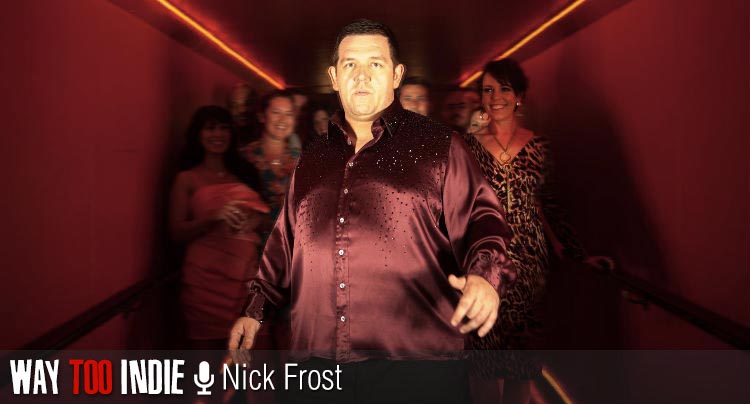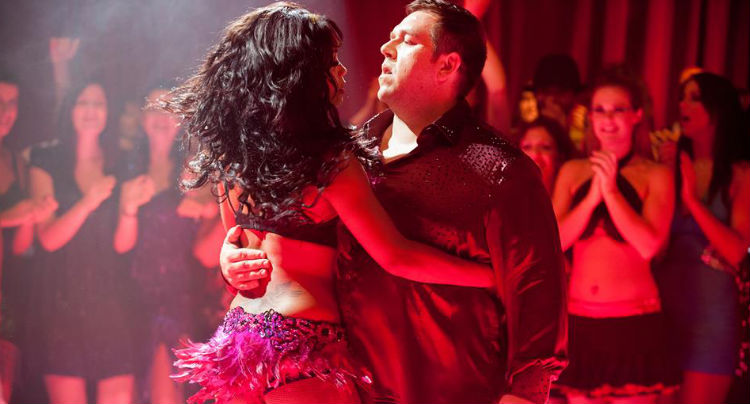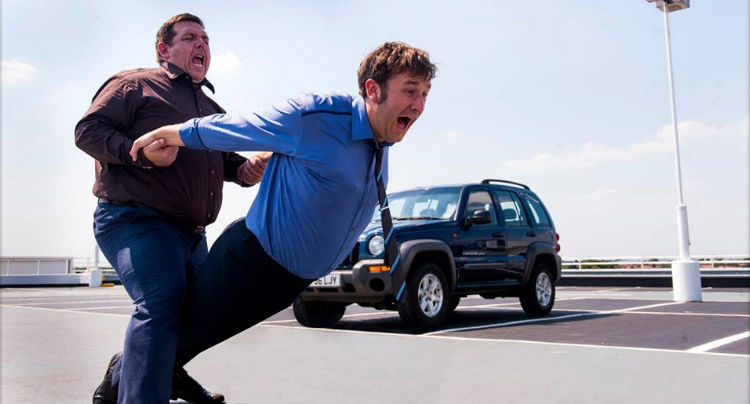Nick Frost Conquers Fear, Salsas Butt Off in ‘Cuban Fury’

In dance-comedy Cuban Fury, directed by James Griffiths, Nick Frost plays Bruce Garrett, a former childhood salsa prodigy who was bullied out of the ballroom to never return. Now in his late 30’s, Bruce is an overweight, insecure pushover who works a desk job. When his new boss Julia (Rashida Jones) catches his eye, he’s suddenly compelled to pick up dancing again to impress her (she salsas herself). Standing in his way is his jerk co-worker Drew (Chris O’Dowd), who’s made it his mission to beat Bruce to the punch and steal Julia’s heart. With the help of his old salsa instructor (Ian McShane), Bruce rediscovers salsa and begins to shed the layers of self-doubt.
Frost, best known for the “Cornetto Trilogy” (Shaun of the Dead, Hot Fuzz, The World’s End), his beloved collaborations with buddies Simon Pegg and Edgar Wright, steps into the spotlight without his famous cohorts in Fury to make a delightful comedy with heart, though he had a personal stake in the production as well. In the following edited roundtable interview with other members of the press, we spoke with Frost about using the movie to get over his fear of dancing, a near-violent, on-set mental breakdown, whether there will be more Simon Pegg and Edgar Wright projects, respecting the salsa community, and more.
How important was it that you do all the dancing in the movie?
Nick: I think it was the crux of it. In terms of me and my motives for wanting to do a dance film and the terror that dancing in front of people brought to me at that point, it was all a part of my catharsis, my incredibly expensive therapy session. I messed our wedding up by not wanting to dance with my wife. We had a dance all picked out, but when it came down to it, it was like grade school where I put my hands on her shoulders, we did this a bit (motions swaying back and forth), and then all of our aunties got on the floor and got it going again. I thought, I shouldn’t have to feel like that, you know? I’m an actor and I do scenes in front of 200 cast and crew every day. I shouldn’t be afraid of dancing.
I think there’s a stigma to being a big man who can dance and enjoys it. There’s a look that people give you, as if they somehow feel sorry for you or somehow say, “You go for it, big guy!” Some sort of patronizing “attaboy”. That makes me so cross. That was part of my reason to want to dance, and I think it kind of helped it get green-lit, really. We could have easily done that thing where you just show my top half moving, show an audience reaction, and then feet. There are a couple of those, [but] 98 percent of it is me. Why wouldn’t you want it to look beautiful? That’s the charm of it, that you see Bruce Garrett doing it.
There’s no Oscar for amount of effort put into a comedy. If it was Daniel Day Lewis putting 7 months training into becoming some kind of man who stuffs animals, people would say, “Wow. His dedication to the role is admirable.” But for a romantic comedy about a big man who woos a girl through the medium of salsa, no one gives a shit about your training. (laughs)

The theme of the film is discovering self-confidence. Is there a breakthrough moment you recall when you realized you don’t need to be insecure about dancing anymore?
Nick: No, because it never got easier. There was never a moment where they unplug a wire from your head, your eyes flicker and you say, “I know Pachanga!” That never happened. I don’t want to seem down, because I loved it. When you watch ten minutes of the film and all of that is me I think, “That’s why I did that.” When you’re in it, it’s like, “Fucking hell, when’s this going to end!”
I became a dancer, you know? Also, I didn’t want to lose weight. I wanted to still be a big lump, so I could eat giant steaks in the morning, 50 bananas a day, a whole chicken…it was like a dream for me! I dressed like a dancer, with leggings on and bands in my hair. I’d find myself sat in a room with fifteen 18-year-old ballerinas. “Just been having a fucking stretch!” I became that dancer.
Were there any breakdown moments?
Nick: Twice I had to leave because I started crying in front of people. Once I was going to hit Richard Marcel, who was my choreographer. I don’t like to be manhandled. I don’t like it. It got to a point at 3 in the afternoon where we’d been dancing since 8 am. I got to that point where he’d be talking to me in English and I would be [hearing Mandarin]. “I don’t know what you want from me!” You know? He moved me [with his hands]. I had that spinach moment (mimics Popeye), but it was too much. He’s only a little thing. I would murder him. I had that thing where my voice kind of went quite high. (In a high voice) “Don’t fucking touch me!” He tried to calm me down and I kind of started to cry in front of him, and then I went into the bathroom. There was a bunch of beautiful-shaped ballerina boys, 18-years-old, no tops on. Just amazing! Then this big fucking gorilla comes charging to the toilet in tears. They were like, “You alright?” and I said, “Just fucking leave me alone!” I went back into the studio eventually, grabbed my kit bag and said (in a high voice), “I’m going home!” That was twice that happened.
Did you find it difficult incorporating a comedy element without disrespecting die-hard fans of dance?
Nick: No, not really. It was never about taking the piss out of salsa. Also, literally spending five minutes with the Latino community in London you realize that, should you disrespect that, you have a big problem on your hands, because that’s the thing those people love more than anything in the world. I was very keen that [salsa] be respected. As soon as the community realized that that was our motive, they couldn’t have helped us more in terms of support and making themselves available for training. Sometimes on a Tuesday morning we’d get 20 dancers in and just spend the morning dancing, which was amazing.
The best lesson I ever did, this Cuban kid would put a tape in, and it was just me and him. I’m a reserved English man. He’d take his vest off, the music would start, and he’d just stand in front of me and kind of pop my chest and let me feel it. I couldn’t do it to start with. “I can’t understand what you’re doing to me! I kind of like it, but…” (laughs) The whole point was that he’d say, “If you don’t feel this…forget it.” He’d put his vest on and go home. That was what my lessons were, little bits like that. It’s only at the last minute, month seven, when you realize, “Oh. That’s what they did.” It wasn’t just choreography, which I could’ve learned in a month. It was making me a dancer.
How did you find playing the lead character as compared to your roles in Hot Fuzz and Shaun of the Dead?
Nick: I’ve got to say, it didn’t feel any different at all. The things about Shaun of the Dead, Hot Fuzz, and The World’s End is that it is a three-way collaboration. Even though Simon was number 1 on the call sheet, I never felt anything but collaborating with Edgar and Simon. In terms of ego, there’s no space for it on our sets. When you do this and you’re not the funniest person on set, you can rumble about it and think, “Why haven’t I got the funniest lines?”, or you can sit back and think, well, it is for the good of the film. If it’s good for the film, it’s good for me. It didn’t bother me. I had the idea, I produced it, I’m starring in it. You can’t do much more. I’m happy to sit back and watch Chris [O’Dowd] and Kayvan [Novak]. I like what they do.
Did you choose Chris to be in the film?
Nick: I think he kind of chose himself. I’ve known him for years and out of everyone I’ve worked with, Chris is the one I have trouble looking in the eyes. He makes me laugh. He improvises a lot, and to improvise you need to know a lot of things that not only fit but push the story forward, too. It’s difficult acting against it, because if you know it’s coming, you can prepare yourself for it. But when that thing is constantly changing, it’s hard to prepare yourself. If you notice, I don’t look at him in the eye at all until the end. The fact is, I just couldn’t look him in the eye. (laughs)
Why salsa, and what was it like working with a writer other than Simon?
Nick: Ballroom had been done by Baz Luhrmann. Strictly Ballroom was a touchstone for this film. The acting’s fantastic, the comedy’s funny, the drama is dramatic, and the dancing is real and beautiful to look at. That’s what we tried to do. It had to be a dance where there’s physical contact between a man and a woman. It could have been tango, but salsa looks beautiful on screen. The colors and sequins are very cinematic. I think it could have been twerking. (laughs) What an awful movie that would be.
I didn’t want to write the film. It takes so long to write a film that you’re then out of the loop for other acting jobs. Me and Simon took so long to write Paul, and that was two years where we weren’t making a film. We’d known Jon Brown for a while and we got on really well. I said, “These are the characters, this is what I think it should be. Go for it!” He wrote a great first draft. He did it in, like, twelve weeks. It was amazing. If you’re going to not write a film and give it to Jon Brown, what you can’t do is meddle. You have to trust him to get on with it. Otherwise, you might as well have written it yourself.

Was there ever a vocation or hobby you took up that got derailed and you wish you’d stuck with?
Nick: Rugby. I played rugby from age 7 to 21. I was at a point in my life where I think I probably could have been pretty good at it, but it came when I discovered weed and girls. I was playing on a team called London Nigeria, and I was the only white player on the team, the first white player to train with London Nigeria. The thing about London Nigeria is, A: They’re fucking massive. B: They used to fist fight a lot during training. You have to make that decision: Do I want to be hit in the face by a 6’8 Nigerian man on a Tuesday night, or am I going to smoke a bowl and try to get off with this beautiful waitress? I chose [the latter]. I stick by my choice, but I loved playing rugby.
News broke that you’re going to do Sober Companion. What was it about that project that appealed to you to make that potential kind of commitment and what might that might mean for your career?
Nick: I think my career is alright as it is. I don’t lie awake thinking, “Fuck. How’s my son going to go to school?” I’m really excited about it and pretty nervous, because I don’t know how this works. All I know is, I was offered this role of an alcoholic lawyer. It’s a great script, and I love Justin Long. I say no to a lot of stuff, and it really annoys my wife. I thought, you have to say yes to something at some point, and this was it. If it’s picked up for six years and goes and goes and goes, that’s a big commitment. If you look at it as six years, that’s a long time. But if you look at it season by season, it’s not so bad.
If you made a sequel to Cuban Fury, what would it be like?
Nick: We’ve thought about this, actually. We thought it would be Bruce and Bejan going to Tehran to open Tehran’s first salsa club. We thought it would be a cross between something Baz Luhrmann would do and Argo. (laughs) Smuggle me in wearing a rhinestone-covered burkha. He’d find a giant old building that was a club at one point and turn it into a hot new night club.
What was your favorite dance scene to shoot?
Nick: The finale. Me, not wanting to dance in front of people, and then there were 600 people in that club, 450 of which some of the world’s best salsa dancers. They stood there for eight days and cheered us on. That dance is cut to pieces, and we shot different parts, as you do, but there were ten or so takes where we shot three cameras as wides and I did the whole dance, top to bottom. It felt amazing. I don’t usually like feeling like that. I never like feeling like, “Oh, you’re doing well!” I always like to punish and doubt myself, but I couldn’t help myself. I could feel the salsa community willing me on, and it was amazing.
What about the car park scene?
Nick: That was a pain in the hole. We chose the five hottest days of the year in London. When it’s hot in London, it’s horrible. It’s like being in Cairo; it’s relentless. 97 degrees. I got injured lifting Chris over my head, I had to have treatment, and they sent me home for the day. Which is terrible on a film set, for the star to go home. If you’re on a $200 million budget it’s like, “Fuck it! You can have a week off if you want.” When you’re the star and producer, you know you can’t not be on set.
Are we going to see another Simon Pegg-Nick Frost collaboration?
Nick: Absolutely. It might not be for a few years, but we have a good idea that makes us laugh. We think about it a lot. We’ll wait for Edgar to finish Ant-Man, and after ten years, when Sober Companion is finished and I can start doing movies again. (laughs)
